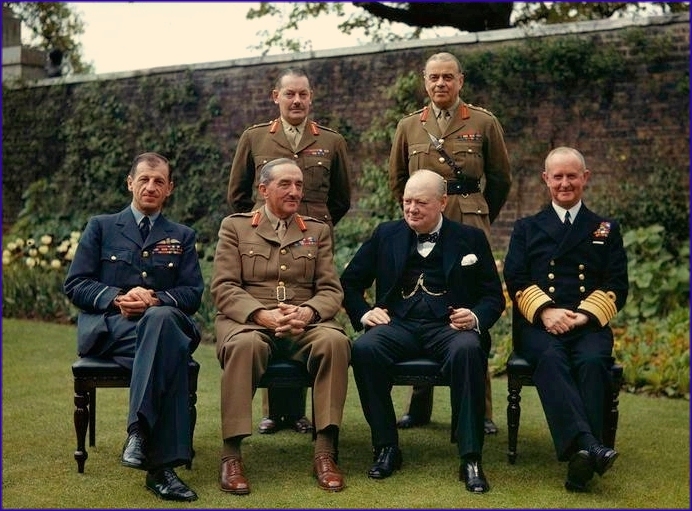Upon finishing an August 1940 inspection of an RAF fighter base (during the Battle of Britain) Churchill muttered to Hastings Ismay, the military staff officer accompanying him, “Never has so much been owed by so many to so few.”
Ismay challenged him: “What about Jesus and the twelve apostles?”
Today many would-be leaders are so thin-skinned as to take such a challenge as an affront. But when Churchill used the idea again a week later in a speech to the commons, it became the eternal phrase “Never in the field of human conflict has so much been owed by so many to so few.” I believe Ismay’s challenge much improved that line. I suppose Churchill thought so too.
In areas with much higher stakes, Churchill was known for repeatedly questioning his top commanders, frequently revisiting subjects his commander thought had been settled. It drove his top commanders to distraction, and they pushed back hard. The discussions sometimes became quite heated.

Churchill and British military leaders at Downing Street the day before the war in Europe ended. Churchill repeatedly banged heads with General Ismay, standing behind him, and General Brooke, seated to his right. Brooke and Ismay, by frequently challenging Churchill, reigned in the Prime Minister’s worst military impulses.
Interestingly, even after these repeated battles, Churchill almost never overrode his commanders, giving them full reign in their area of expertise. It appears Churchill was trying to insure that every possibility and eventuality had been considered. He challenged his commanders, and was challenged in return.
By comparison, Churchill’s contemporary, Franklin Roosevelt, sacked Admiral James Richardson, commander of the Pacific Fleet and widely recognized expert on Japanese strategy, for expressing his doubts about basing the fleet at Pearl Harbor beginning in 1940 (i.e., before the U.S.A. became involved in the war), doubts that were widely shared in the navy and seem pretty reasonable in hindsight.
Roosevelt, who evidence suggests was quite a know-it-all, felt that Richardson, who was stationed with the fleet at Pearl Harbor, had been “disrespectful” in speaking truthfully about the situation in Hawaii and the problems it presented. Never mind that Richardson was a career navy officer and would have followed any legal order Roosevelt gave. Roosevelt wouldn’t tolerate what he perceived as criticism. When the Pearl Harbor attack came a year later, Roosevelt didn’t take the blame for the fleet being based in Hawaii with resources and intelligence grossly inadequate to defend itself from attack. The blame instead fell on Richardson’s successor, Admiral Husband Kimmel.
Roosevelt was very different from Churchill with respect to how he dealt with challenges to his ideas.
If you are threatened by challenges to your ideas, you can’t be a leader. And you probably don’t belong in management, either.
More Leadership Lessons from Winston Churchill:
Listen.
Ask questions.
Give clear directions.
Don’t get angry at challenges to your ideas. Learn from them.
In most cases, it isn’t the person, it’s the process.
Learn to think in terms of a system.
Go and see for yourself.
Measure a lot of things, and have something to compare them to.
Have courage. Tell the truth, and expect others to do the same.
Great oratory is built on great arguments. Master your facts and your arguments first.
Copyright 2015, 2018 by Paul G. Spring. All rights reserved.
